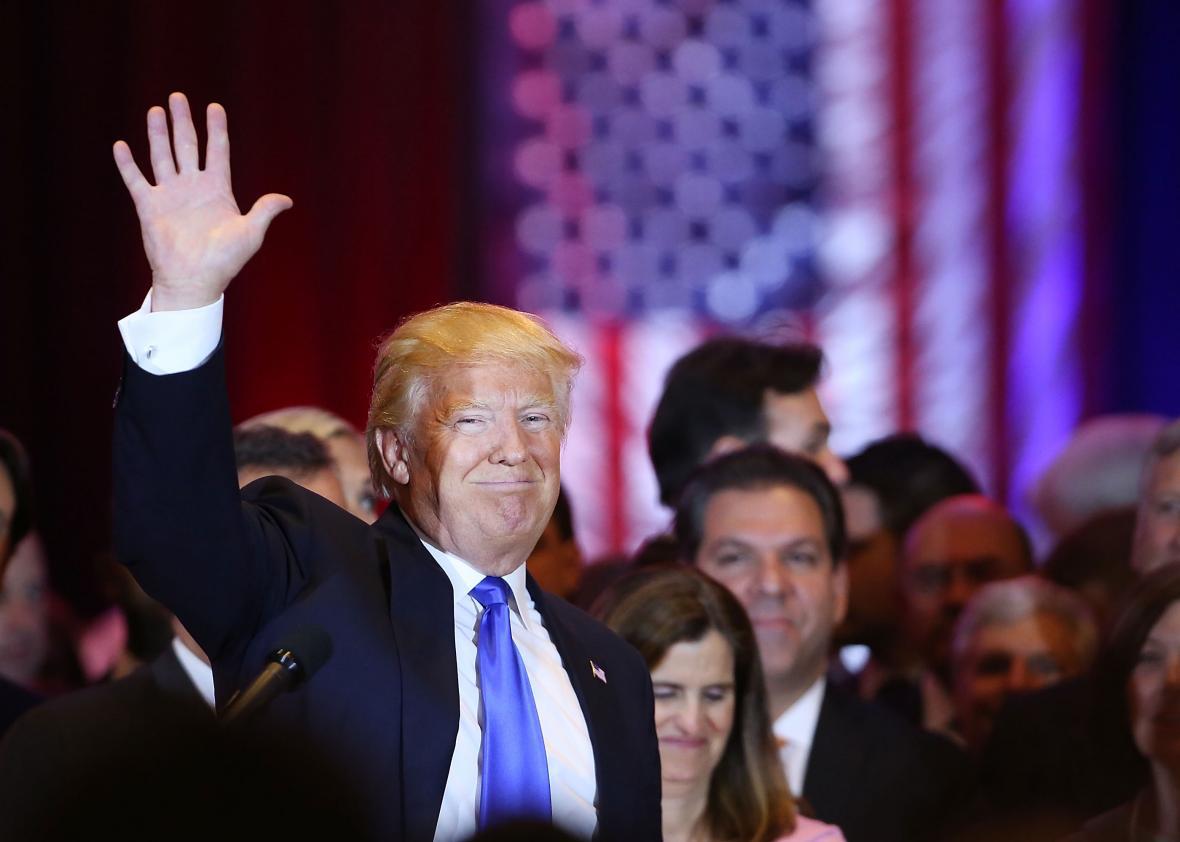Once Donald Trump became the presumptive Republican presidential nominee, some conservatives wondered whether congressional Republicans should simply confirm Merrick Garland, a judicial moderate, rather than take a gamble with Trump. The candidate, after all, has been vague on his ideal Supreme Court candidate—even floating his sister, a left-leaning federal judge. On Wednesday, however, Trump likely squashed any Republican fears that his judicial selection would be insufficiently conservative and signaled to those Republicans still unsure about supporting him by releasing his SCOTUS short list. The 11 names on his list are all staunchly right wing, more in the vein of the blatantly partisan Justice Samuel Alito than of the libertarian-leaning iconoclast Justice Antonin Scalia.
Let’s start with Judge Raymond Gruender, whom George W. Bush appointed to the 8th U.S. Circuit Court of Appeals. Gruender is best known for voting to uphold a South Dakota “informed consent” law, which requires doctors to reel off dubious information about abortion to women seeking the procedure—including the statement that “abortion will terminate the life of a whole, separate, unique, living human being.” The judge also voted to cease federal monitoring of a desegregation plan in Little Rock, Arkansas. (Little Rock—what could go wrong there?) And Gruender issued a very Alito-like opinion in a decision concluding that the Pregnancy Discrimination Act of 1978 did not require insurance companies to cover contraception for women who only need birth control to prevent pregnancy.
Then there’s Thomas Hardiman. Another Bush appointee, Hardiman is a law and order guy. He wrote an opinion affirming the constitutionality of a jail’s policy to strip search every single arrestee—even those brought in for minor traffic offenses. (Regrettably, the high court narrowly upheld his decision.) In a different case, Hardiman wrote that there is no clearly established First Amendment right to videotape law enforcement officers in public—an extremely dubious if not outright incorrect proposition. Hardiman reads the Second Amendment quite broadly, arguing that states cannot restrict residents’ ability to carry handguns in public. And while he interprets the First Amendment broadly in the realm of campaign contributions, he takes a very narrow view of students’ free speech rights. Sound familiar?
Diane Sykes, a 7th Circuit judge and yet another Bush nominee, follows a similar pattern. Sykes once wrote that the First Amendment likely requires public universities to give taxpayer money to student groups that discriminate against gay people—a conclusion that the Supreme Court ultimately rejected. She also held that the Constitution protects firing ranges, locating a right to use such ranges in the penumbra of the Second Amendment.
William Pryor, an 11th Circuit judge, has an equally conservative history. Pryor was one of the first federal judges to dramatically expand the Supreme Court’s Hobby Lobby ruling, applying it to a Catholic TV network. Pryor also blocked a Florida clean elections law that contributed matching funds to a high-spending candidate’s opponent, holding that it violated the high-spending candidate’s freedom of speech. But he upheld a Georgia ordinance designed to zone adult entertainment stores out of business. Pryor also affirmed the constitutionality of a strict Georgia voter ID law and held that a Supreme Court decision limiting juvenile life without parole did not apply retroactively. (The Supreme Court disagreed with him.)
And then there’s Don Willett, a Texas Supreme Court Justice whose delightful social media presence distracts from the fact that his constitutional views place him somewhere in the 1890s. Willett believes judges should use constitutional due process guarantees to invalidate economic regulations they don’t like. The U.S. Supreme Court struck down oodles of progressive legislation, including much of the New Deal, under this same theory; taken to its logical conclusion, it would require the court to invalidate most of our regulatory state. Willett is no fan of Trump—but could he really resist that tantalizing opportunity?
Although the rest of Trump’s picks have a more opaque record, they appear to be pretty much more of the same. These are judges who think the First Amendment protects a religious group’s right to discriminate against gays, and plutocrats’ right to buy elections, but not the free speech of students or abortion doctors. Down the line, they view the Second Amendment as near-absolute. They don’t like economic regulation, abortion, or contraception, but they don’t mind stringent voting restrictions. Oh, and they are all absolutely brilliant. If this is what you want the United States Supreme Court to look like—and a lot of conservatives do—Trump is your man.
